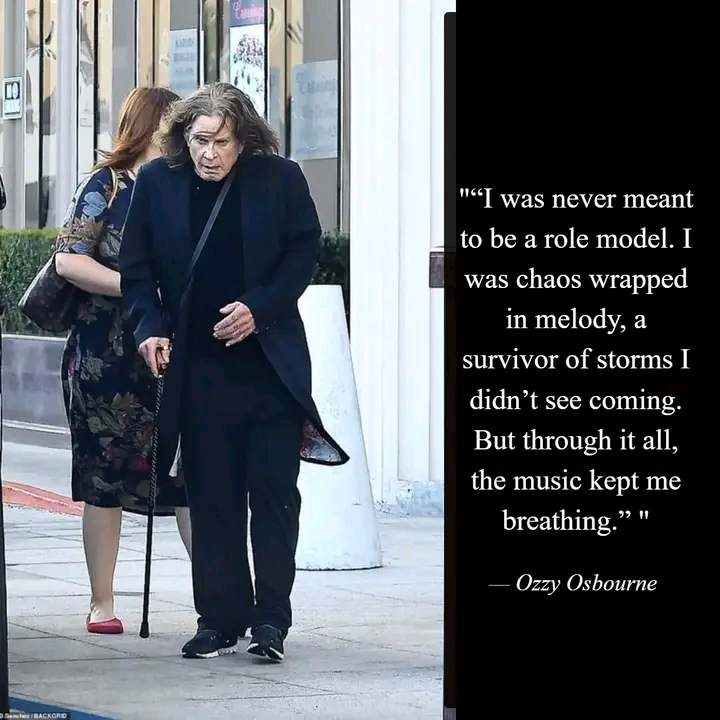Ozzy Osbourne: The Indestructible Prince of Darkness and Heavy Metal Pioneer
Born John Michael Osbourne on December 3, 1948, in Aston, Birmingham, England, Ozzy Osbourne would go on to become one of the most influential and recognizable figures in the history of rock music. Known affectionately as the “Prince of Darkness,” Osbourne’s journey from a working-class upbringing to global superstardom is a tale of raw talent, personal struggles, and unrelenting passion for music.
The Rise of Heavy Metal: Black Sabbath’s Legacy
Ozzy’s rise to fame began in the late 1960s when he teamed up with guitarist Tony Iommi, bassist Geezer Butler, and drummer Bill Ward to form Black Sabbath. Their self-titled debut album Black Sabbath was released in 1970, and with its sinister riffs and haunting lyrics, it laid the cornerstone for what would become heavy metal. The album’s title track, with its doom-laden sound and chilling atmosphere, immediately set them apart from their contemporaries.
That same year, the band followed up with Paranoid, an album that would not only cement their legacy but also change rock music forever. Songs like “Paranoid,” “Iron Man,” and “War Pigs” became instant classics, driven by Iommi’s monolithic riffs and Osbourne’s eerie, powerful vocals. Their third album, Master of Reality (1971), continued their momentum and became another defining moment for the genre, with tracks like “Sweet Leaf” and “Children of the Grave” that emphasized darker lyrical themes and heavier instrumentation.
Throughout the 1970s, Black Sabbath became synonymous with rebellion and darkness, and Ozzy’s unique voice, paired with his chaotic stage antics, made him the face of the movement. However, as the decade progressed, internal conflicts and Osbourne’s escalating drug and alcohol use began to take their toll.
The Blizzard of Ozz: A Triumphant Solo Career
In 1979, Osbourne was dismissed from Black Sabbath, a move that could have ended his career. Instead, it marked the beginning of a new chapter. Teaming up with young guitar virtuoso Randy Rhoads, Ozzy launched his solo career with Blizzard of Ozz in 1980. The album was an immediate success, powered by iconic songs such as “Crazy Train,” “Mr. Crowley,” and “Suicide Solution.”
Rhoads’ innovative guitar work combined with Ozzy’s knack for catchy, yet heavy, melodies propelled the album into rock history. Tragically, Rhoads died in a plane crash in 1982, but his impact on Osbourne’s music remains immeasurable.
Osbourne continued his solo success throughout the 1980s and 1990s with albums such as Diary of a Madman (1981), Bark at the Moon (1983), The Ultimate Sin (1986), and No More Tears (1991). Collaborations with guitarists like Jake E. Lee and Zakk Wylde kept his sound fresh and powerful. Songs like “Mama, I’m Coming Home,” “No More Tears,” and “Shot in the Dark” became staples of rock radio and live performances.
The Osbournes: A Cultural Phenomenon
In 2002, Osbourne reinvented himself once again, this time as a reality TV star. The Osbournes, which aired on MTV, offered an unfiltered glimpse into the chaotic but loving life of the Osbourne family. The show became an instant hit, showcasing Ozzy’s humorous and bewildered reactions to everyday situations and introducing him to a new generation of fans.
The series not only solidified Ozzy as a pop culture icon but also humanized the heavy metal legend, showing a more vulnerable and relatable side of the man often associated with biting the head off a bat and outrageous onstage antics.
Honors, Legacy, and Resilience
Ozzy’s contributions to music have not gone unrecognized. In 2006, he was inducted into the Rock and Roll Hall of Fame as a member of Black Sabbath. His impact as a solo artist was also acknowledged when he received a nomination for induction as a solo act in 2024.
Throughout his career, Osbourne has faced numerous personal and health challenges, including battles with addiction, a near-fatal ATV accident, and a diagnosis of Parkinson’s disease in 2020. Despite these obstacles, Ozzy has shown remarkable resilience, continuing to record music and even return to the stage on occasion.
His 2020 album Ordinary Man featured collaborations with artists like Elton John and Slash, further proving his enduring influence across genres. He followed it up with Patient Number 9 in 2022, featuring guitar legends like Jeff Beck and Eric Clapton.
More Than a Musician: A Cultural Force
Ozzy Osbourne’s appeal extends far beyond his music. He is an enduring symbol of rebellion, survival, and artistic freedom. Whether as the frontman of Black Sabbath, a solo artist, or a reality TV star, he has consistently defied expectations and broken boundaries.
From his humble beginnings in Birmingham to the biggest stages in the world, Ozzy’s career is a testament to the power of music to transcend time, trends, and even personal limitations. His distinct voice, magnetic stage presence, and larger-than-life personality continue to inspire generations of musicians and fans alike.
Even now, as he contends with health issues, Ozzy remains active in the music world and maintains his place as a cornerstone of metal culture. His impact on heavy metal and rock music is undeniable, and his story serves as a reminder that true icons are forged not just by talent, but also by resilience, vision, and an unyielding love for what they do.
In the words of Ozzy himself, “I’m not going anywhere.” And indeed, it seems the Prince of Darkness is destined to reign forever.
